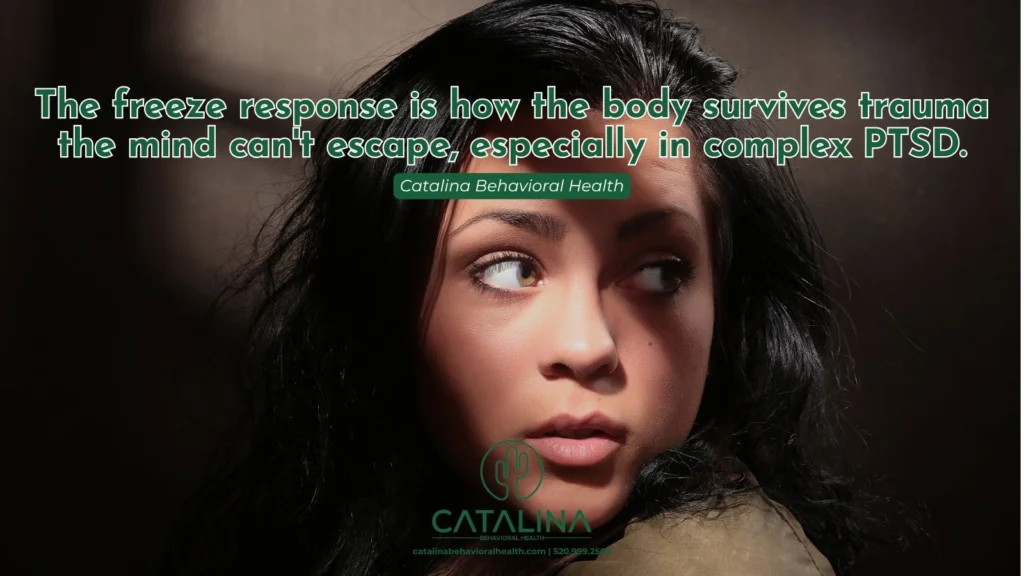Get Support to Overcome Freeze Responses to Complex Trauma
The complex PTSD freeze response is a natural response driven by the autonomic nervous system. This third stress response happens under extreme stress, when the fight or flight response is unavailable. Our biological systems designed this to help the brain survive extreme danger by shutting down awareness of pain or fear when fighting or fleeing is impossible.
During imminent danger, the freeze response causes the person to shut down or dissociate to survive the perceived threat.
Catalina Behavioral Health of Tucson, Arizona, has helped innumerable people desensitize the traumatic memories that cause post-traumatic stress disorder, anxiety disorders, and other mental health conditions.
We understand how trauma survivors with CPTSD can have so much unprocessed trauma that they’re feeling stuck. The staff at our Joint Commission-accredited treatment facility provides psychological and behavior therapy to reduce stress and restore balanced trauma responses.
We encourage you to read this article if you are struggling with the chronic stress of complex trauma. You’ll learn about the emotional responses and how we can help you overcome your past traumatic experiences and an overactive freeze response.
Get a Confidential Trauma and PTSD Assessment
Understanding Complex Trauma and Stress Responses
Think of complex trauma like a multi-layered cake. Each traumatic event or memory builds on top of another. The base layer of the cake is the freeze response – it’s invisible under all those top layers, but supports them nevertheless.
Clients who live with trauma, panic attacks, or other trauma-related mental health concerns may already have overloaded their flight or fight response. That overload makes their body susceptible to the freeze state during a real, immediate threat.

Fight or Flight Response Vs. Freeze Response (and Fawn Response)
When the brain detects danger, the body’s autonomic nervous system kicks into high gear. It reacts to protect us from perceived danger. They’re active responses – during either, your heart rate increases and muscles tense up. The subconscious is preparing to confront or escape the danger.
On the other hand, the freeze response is a passive defense mechanism. You’re not able to run or fight, so the body shuts down or goes numb. Some would make a theoretical note that the fawn response, where the person tries to please others to avoid conflict, would fall into the same category as freeze, as the person tries to avoid conflict.
The events that drive traumatic responses in the body include anything from assault or physical abuse to the sudden loss of a loved one. One person’s reaction to an event can be completely different than a peer’s.
Signs of the Third Stress Response (Freeze State)
Here are some of the most common signs of freeze stress response:
- Dissociation, they may feel numb or disconnected
- Difficulty speaking
- Shallow breathing
- Blank stare
- Lack of emotional response
- Neutral facial expressions
- Decreased heart rate
- Blood pressure changes
These signs, which some call tonic immobility, happen when the body’s freeze response survival mechanism has taken over.
Polyvagal Theory May Best Explain the Automatic Nervous System
Polyvagal theory, developed by Dr. Stephen Porges in 1994, explains how the autonomic nervous system, especially the vagus nerve, regulates the human response to stress, danger, and social connection. Since its inception, the theory become an integral part in providing trauma-informed care.
Dr. Porges suggests that the nervous system has three responses to perceived danger or threats:
- The social engagement system, the ventral vagal, promotes a sense of calm during safe moments.
- The fight or flight response, or the sympathetic nervous system, prepares us to flee or fight as a reaction to perceived danger. Flight or flight is the typical initial response to trauma.
- Freeze or shutdown reaction, the dorsal vagal, incapacitates us when danger is (or seems) inevitable. Freeze is a secondary response when flight or fight responses are not available.
This behavioral science theory proves that the freeze trauma survival mechanism is not a choice but is driven by biological factors.
Mental Health Conditions That Come From Unmanaged Trauma

Many people will naturally heal after experiencing trauma. The brain learns to push the traumatic memories to the back, helping dull the pain of the most overwhelming details of the event.
But complex trauma builds up due to multiple or prolonged traumatic events, worsening with each added layer. Here are some possible mental health concerns that can arise from trauma triggers:
- Post-traumatic stress disorder
- Anxiety disorder
- Depression
- Dissociative disorder
- Substance use disorder
- Personality disorder
- Obsessive-compulsive disorder
- Borderline personality disorder
Without professional treatment, complex trauma complicates things, making it nearly impossible to return to their typical daily life after a traumatic experience.
Get Accredited Treatment Programs at Catalina
Receiving Evidence-Based Trauma Treatment at Catalina
If you’ve been unable to control your responses to trauma, our treatment center can provide you with fresh hope. We take a fully integrated approach to mental health and can stabilize your trauma responses by using cutting-edge behavioral neuroscience and time-proven psychotherapies.
Pre-treatment Insurance Verification Services
One of the most anxiety-inducing moments when considering treatment is fear about paying for the costs. Our dedicated insurance specialist helps clients access complete information about their insurance policy and coverage.
We work with most major private insurance plans. You don’t need the added stress of calling your insurance company’s frustrating toll-free number – call us instead. We make the phone calls for you and then respond. We’ve often helped clients obtain zero co-pay treatment options.
Multiple Levels of Care to Suit the Needs of Clients

Catalina is a full-service behavioral health treatment center that accommodates the needs of all clients. Part of how we can achieve this is by providing the right level of care.
Inpatient Treatment Services
We offer a supportive, intensive inpatient treatment center for those who have the most pervasive mental health disorders. Those who have co-occurring disorders, such as severe anxiety plus substance use disorder, or anyone threatening self-harm or hurting others benefit from this 24/7/365 level of care.
Outpatient Treatment Programs
Catalina also offers two outpatient offerings, partial hospitalization programs or intensive outpatient programs. Clients in these levels of care may have a freeze or fawn response, but it does not interfere with their daily functioning.
They enjoy a balance that includes getting therapy while also attending to other responsibilities, such as family, school, or career.
Holistic Treatments to Break Free from Trauma and Reduce Anxiety
We take the time to get to know your panic response to gain a greater sense of your triggers and how we can support you. This assessment helps us design a customized treatment plan that helps clients regain control over overwhelming trauma-related feelings. We’ll review your psychological record to understand which therapies have proven helpful and which have not.
We’ll also apply best environmental medicine practices to help you avoid any person or situation that can trigger your freeze response as you heal. During the healing process, we’ll monitor how your body heals as we continue removing the negative impact of stress in your life. You’ll regain both mind and body wellness.
Regain Emotional Control with Skilled Therapists and Counselors

Tonic immobility is not a common reaction to stress. It comes only when a perceived threat has overwhelmed flight or fight responses. When someone starts to feel stuck in place by complex trauma for too long, it can shape negative behaviors.
Our compassionate, expert therapists and counselors will help you pinpoint the exact nature of your traumatic event, minimize its impact on your body and mind, and help you respond to it more healthily in the future.
Alternative Therapies
We recognize that each person can benefit from evidence-based alternative treatments that become coping tools post-treatment. For example, you may learn grounding exercises to keep you in the present moment and regulate your breathing when anxiety or fear threatens to take over. It gives you a sense of control over your reactions and helps you better manage your fear.
Up To 100% of Rehab Costs Covered By Insurance
Connect with Catalina for Healthier Trauma Responses
Every person responds to traumatic experiences uniquely. But in its complex form, post-traumatic stress disorder can trigger the freeze response in the body more often. Its presence can interfere with living a quality life and lead to other mental complications.
In the worst cases, it destroys careers and relationships or leads to a complete breakdown in mental well-being.
Are you ready to have healthier mental wellness and manage the freeze response by healing complex trauma? Call Catalina today – it’s free and confidential to speak with us.




